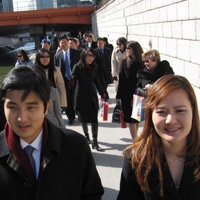Korean-American Fellows Visit Homeland
June 04, 2007 / by Maya MeinertThe NetKAL fellowship program promotes community-based leadership among Korean-American leaders, bringing them together in the classroom with some of USC's leading educators and giving them access to the resources they need to pursue their goals, build coalitions and communicate effectively as empowered leaders at all levels of American society.
NetKAL fellows are generally either second-generation Korean Americans or Korean Americans who left Korea at a young age. While many have extensive experience with Korea and the Korean-American community, others have little knowledge of where they came from, have never worked with other Korean Americans and have few Korean-American friends. The trip gave them the opportunity to forge a connection with Korea and to learn more about their Korean identities while also taking advantage of networking opportunities.
Robert Kim, a principal with the real estate development firm Renaissance Pacific Properties in Newport Beach, Calif., was delighted to have the opportunity to visit the land of his birth. Robert left Korea at the age of 12 and had not been back until the NetKAL trip, 26 years after he left.
"Going back to the 'motherland' was certainly eye opening, and certainly not the way I remembered it as a child," Robert said. "I learned that Korea is not so different than the U.S., and yet, it is so different at the same time. There are lots of unwritten rules and customs that I was not aware of growing up in the U.S. The country is very complex."
Fellows visited landmarks including Gyeongbok Palace, Independence Memorial Hall and the Korean Demilitarized Zone and viewed a Nanta percussion performance. In addition to the cultural visits, fellows had the opportunity to meet with influential Korean policymakers and businesspeople, including former president and Nobel Peace Prize winner Kim Dae-Jung; Vice Speaker of the Korean National Assembly Lee Yong-Hee; and President and CEO of SK Telecom Kim Shin-Bae.
Gloria S. Kim, the annual fund manager of the Los Angeles Philharmonic Association, said this trip to Korea with NetKAL was the best one she has ever taken. Gloria left Korea at age 10 and has been back to visit in recent years, but her experience in Korea with NetKAL was exceptional.
"The unique combination of cultural and historical lessons, with updates on the current political, economical and cultural state of Korea, was very engaging, informative and eye opening," Gloria said. "Korea's key leadership in the IT industry impressed me beyond my expectations. It made me feel very proud to be a Korean American."
Gloria also learned about herself in learning about the past. "I have gained a better understanding of my parents' generation and their culture, mindset and priorities," she said. "Learning more about their lives prior to immigrating to the U.S. helped me to connect with the first-generation Koreans more effectively."
Through this visit and the NetKAL experience in general, Robert and Gloria have come to better understand their heritage while connecting with other Korean Americans who share similar experiences.
Having never collaborated with other Korean Americans, Gloria cherishes her position in NetKAL, which has provided the means for her to get involved in the community.
"As a NetKAL fellow, I hope to continuously network with fellow Korean-American leaders and make contributions to the Korean and Korean-American communities in the U.S. by bridging gaps within many facets of our society," Gloria said.
Robert has also found the program to be instrumental in connecting with other Korean Americans. Before joining NetKAL, Robert had one Korean-American friend. He has called the program a "life-changing experience."
"With NetKAL, I learned that I am not alone – there are lots of others who are like me," he said. "NetKAL has provided me with a network of Korean-American friends whom I never would have met. All my previous notions about Korean-American society have been erased, and have been replaced by a healthy vision of where things are and where things can be in the future.
"We can work together to have a bigger impact on Korean-American society and American society in general."
To reference the work of our faculty online, we ask that you directly quote their work where possible and attribute it to "FACULTY NAME, a professor in the USC Suzanne Dworak-Peck School of Social Work” (LINK: https://dworakpeck.usc.edu)
